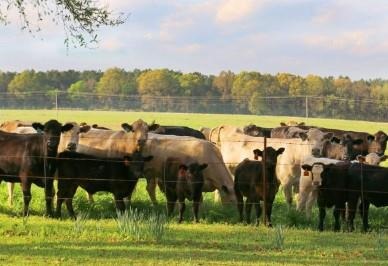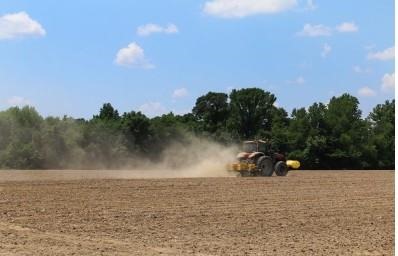When deciding to start a farm, many aspects of the business should be considered before planting or buying livestock. New and inexperienced producers often find it challenging to start the business planning process. Learn points to consider before beginning a farm operation and the resources that will be helpful along the way.
Land Requirements
All agricultural production requires land, but the amount needed depends on the crop, cropping system, and scope of the operation. For instance, a small vegetable operation will require far less acreage than a conventional livestock operation. People may purchase or inherit land they would like to put into some type of production but aren’t sure what they would like to grow. The amount of land available can determine, to a degree, what commodities can be profitably produced. If access to owned land does not support the commodity to be produced in terms of area needed, renting farmland can be an option if it is available. Land rent costs are determined by location, productivity, and other variables. Land rent should be factored into an enterprise’s cost of production. Average land rental rates by county are released by the United States Department of Agriculture National Agricultural Statistics Service (USDA-NASS) annually; Extension personnel can help find the local average rate from this report should you need assistance. Land rates, however, should always be considered situational, and you should attempt to gather local rates relative to the land and enterprise you would like to pursue.
Labor Requirements
Farming operations may require significant amounts of labor to produce a marketable commodity. Often, producers can only contribute part of their time to the operation due to an off-farm job or other responsibilities. When considering an agricultural enterprise, a new grower should understand the labor requirements for their operation. Producers should evaluate their ability to contribute adequate time or their ability to find and afford the labor required to get the commodity to market.
Experience and Training
Agricultural production requires skill and experience to be profitable and sustainable. Regardless of the commodity, a considerable amount of knowledge is needed to produce it. For new growers or those considering a farm, it is imperative to evaluate your current level of expertise and access to resources to increase your base knowledge.

Funding
A common question beginning producers ask is how to pay for the startup costs for farming. Unfortunately, there are few, if any, grants available to cover starting a farming operation. In some instances, a producer may be eligible for cost-share programs for conservation practices through the Natural Resources Conservation Service (NRCS). Visit the NRCS website to find a local office. However, the costs for beginning a farm will generally be self-funded or financed. Financing options for agriculture include agricultural lenders and the Farm
Service Agency. Documentation and eligibility will vary among institutions, and each should be contacted directly to determine requirements. Visit the FSA website to find a local county office for more information about financing and other services provided by FSA.
To determine finance requirements for a farming startup, it will be essential to understand how much each crop or commodity will cost and how much each commodity can reasonably be expected to earn. Developing budgets before planting or purchasing any farm investment is key to ensuring that the operation can be profitable. Alabama Extension offers budgets for many of the commodities produced in the state. These budgets are available on the Alabama Extension website at www.aces.edu and should be adjusted to reflect the practices and expected price received for individual farms and growers.
Farmers should also develop a business plan with short- and long-term goals, market strategy, expenses, and profit potential. Even if it is not required for financing, a business plan is key to staying on track with the operation’s goals. Various online options are available to guide the development of the business plan. AgPlan offers free business plan software specifically designed for agricultural producers.
Farming as a Business
Many decide to begin a farming operation because they are passionate about growing or producing crops or livestock. But for long-term success, a farm must be operated like a business. When starting a farm, a grower should consider opening a farm bank account to keep personal and business expenses separate. A producer also needs to decide how records will be kept. Keep detailed financial records and production history for tax purposes, financing, and decision-making tools for future farm management. Several software options are available to track expenses and income, but growers should use a system they are comfortable with and will routinely use. Find an accountant to help with record keeping and tax preparation. An accountant can also assist a grower with developing three primary financial statements to evaluate how an operation is performing. These statements, a balance sheet, an income statement (or profit and loss statement), and cash flow statement will give the grower a record of what assets are on hand, how much is owed, how much is spent, how much is being earned, and when expenses and receipts occur throughout the year, respectively. This last statement, the cash flow, is particularly important because agricultural production often has months of input costs before any crop can be harvested to sell. A producer should have an accurate accounting of these costs to be able to cover expenses until a crop is sold.
Market
When considering a farm operation, a producer should determine the market for the crop or commodity produced before it is produced. Numerous avenues are available for marketing a product, but each market requires different pricing strategies, advertising and social media activity, or licensing and training requirements to sell to that market. Direct marketing, farmers markets, and farm stands are options that may be appropriate for beginning growers. Local Extension agents can assist in determining if there is a market opportunity and what steps producers should take to become established in that market.

Licensing and Permits
For raw agricultural products produced in the state and sold without processing, growers will generally need a grower’s permit. This permit allows for the sale of products without collecting sales tax or other licensing fees. These free permits can be obtained by the grower at the county Extension office and are generally required to sell at farmers markets or roadside stands. Find information about the grower’s permit on the Alabama Extension website at www.aces.edu. A business license and food safety training may be required for processed products, such as jams and jellies. The Alabama Cottage Food Law permits some processed food products to be prepared in home and sold to the public. But there are specific requirements, and not all foods qualify. Foods sold with labels also have strict requirements. Learn more about the Alabama Cottage Food Law and requirements for selling processed foods at www.aces.edu. Marketing of livestock falls under the same umbrella as marketing produce. Producers are not required to have a license or permits in most situations if they are selling their home-raised animals. Producers may choose to market custom-exempt processed, state, or federally processed products. Contact your regional animal science Extension agent for details or help to determine what is best for your operation.
To obtain federal loans, disaster assistance, cost-share funds, or crop insurance, growers may need to apply for a farm number through the Farm Service Agency (FSA). The farm number not only provides a means to identify a farm for government purposes but also a way to track the production history of individual farms. If rented land is in operation, the farm number may already exist. The local FSA office can provide landowners with the information needed to obtain a farm number.
New and beginning farmers should work with an accountant or legal expert to determine the type of business entity the farm will be. Whether the operator is a sole proprietor, an LLC., or another entity, this should be determined early in the formation of the farm because there are tax implications for the different types of businesses.
Insurance
Give careful consideration to the different types of insurance available for a farming operation. In addition to insurance policies to protect equipment and buildings, there is also the possibility of purchasing crop insurance to protect against crop loss. A wide range of policies are available in terms of coverage level and program, and agricultural lenders may require some insurance for financing. Find a local crop insurance representative through the USDA Risk Management Agency (RMA) website. The Noninsured Crop Disaster Assistance Program (NAP) through the FSA may be available for producers of commodities not covered by a crop insurance program. Those involved in any agritourism operation with visitors on site should consider an insurance policy in case any accidents occur on the farm.
Source : aces.edu